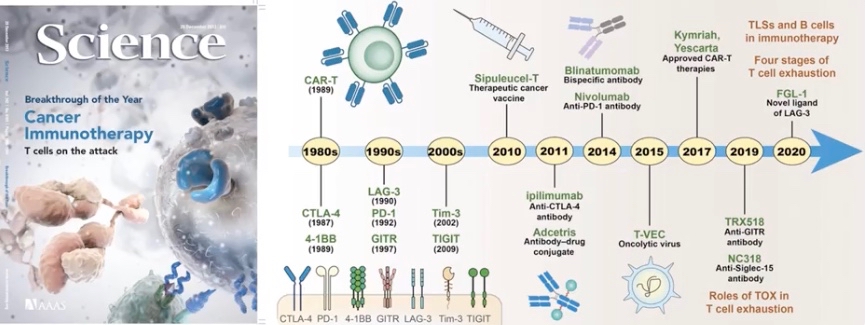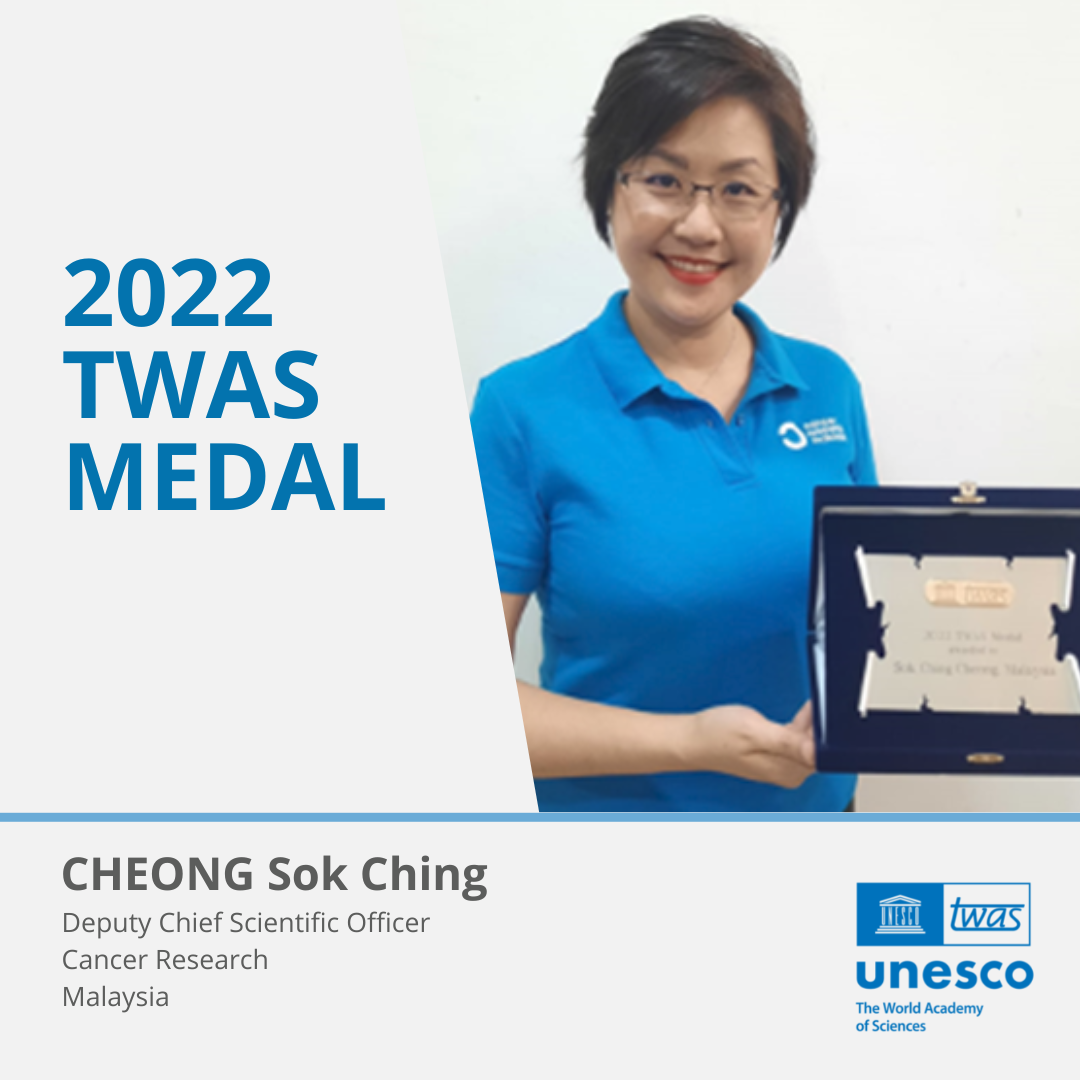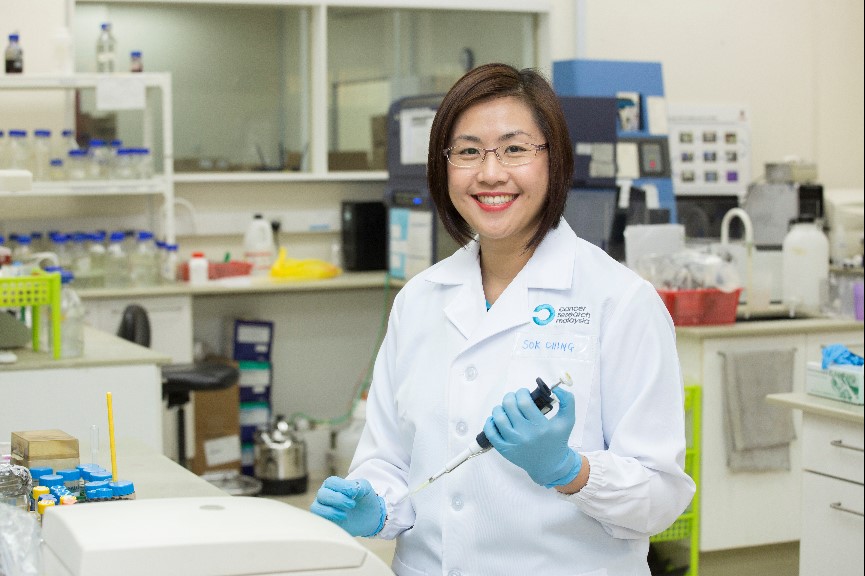
One way to fight oral cancer is to modify the genes of cancer cells, shows research by TWAS Young Affiliates Network (TYAN) Alumna Sok Ching Cheong of Malaysia, who is one of this year’s recipients of a prestigious TWAS Medal.
TWAS announced the awards on 21 November, following the opening ceremony of the TWAS Sixteenth General Conference, taking place in Hangzhou, China, until 24 November 2022. Cheong, the Deputy Chief Scientific Officer at Cancer Research Malaysia, received the honour along with Rajaâ Cherkaoui El Moursli of Morocco, a TWAS Fellow since 2018; George Fu Gao of China, a TWAS Fellow since 2014; and Bruce M. Alberts of the United States, a TWAS Fellow since 2001.
On 23 November, Cheong made a presentation—one of the 'traditional' TWAS Medal Lectures—on the results of her research.
Oral cancer is the fourth most common form of cancer in low- and medium-income countries. However, it still lacks effective therapies, because the drivers of this cancer are poorly understood and, in general, as Cheong said "the development of targeted therapies for these cancers has not yet received the attention it deserves." In addition to her work aimed at identifying oral cancer genes, Cheong spotted, with her team, unique cancer-associated antigens that have led to the development of an innovative vaccine for oral cancer.
"I am very grateful to TWAS for this recognition of my scientific achievements. I feel privileged and honoured to have been given an opportunity to work with passionate and like-minded scientists of TWAS to establish TYAN for the benefit of young scientists globally," said Cheong, who was one of the first TYAN co-chairs.
TWAS launched TYAN in 2016, during the TWAS Twenty-seventh General Meeting in Kigali, Rwanda, to recognize the most accomplished young scientists from developing countries and promote the creation of international collaborations.
A renowned scholar whose scientific goal is to contribute to the management and survival of cancer patients, Cheong's stand-out achievements earned her national and international scientific awards, including the 2008 L’Oreal For Women in Science Award, the 2021 President’s Prize by the International Association of Oral and Maxillofacial Pathologists, and the 2022 Underwriters Laboratories-ASEAN-US Science Prize for Women.
In her TWAS Medal Lecture, Cheong presented recent estimates about the onset of cancer in the global population, which suggest that, by 2030, one out of eight people in low-and middle- income countries will experience a cancer diagnosis. “Sadly, the largest increase in the global cancer burden will also come from these countries in the next 50 years,” she said.
Cheong observed that there are still many disparities in oral cancer research and treatment. "Moving from 'one treatment fits all' to what is known as precision oncology, or targeted therapy, is becoming urgent," she said. This is why she focused her work on identifying ways to attack cancer cells at weak points in their genomes.
"To come up with new strategies to kill oral cancer cells, we have used the high-throughput CRISPR/Cas9 technique," she explained, "which allowed the identification of the weak points of oral cancer in Asian oral cancer cell lines."
The CRISPR/Cas9 technique, a gene-editing tool discovered by Jennifer Doudna and Emmanuelle Charpentier that won them the Nobel Prize in 2020, is a way to tweak or delete genes in individual cells. Scientists can use this technique to edit genes by precisely cutting DNA and then letting natural DNA repair processes to take over.
Using CRISPR/Cas9, Cheong and her group successfully identified 918 genes that are instrumental in one kind of oral cancer and then studied them in depth. "Our laboratory has one of the largest panels of oral cancer cell line models in the world. With our results, we have contributed to one-third of the available data on oral cancer essential genes globally," she explained.
The identification of oral cancer genes could form the basis for developing better approaches for treating this disease. For example, based on cancer proteins that Cheong and her team discovered, these scientists have developed a vaccine that, in lab models, inhibits 97 per cent of growth of tumour cells. The first human clinical trials are planned to take place soon.
"These results stem from international collaboration with many partners, including those at the Wellcome Sanger Institute and the University of Southampton in the United Kingdom; the University of California San Diego and the Huntsman Cancer Institute, in the United States; and the University of Malaya and the Ministry of Health of Malaysia," commented Cheong.
"Most of the scientists who gave their contribution to this project are young, passionate scholars," she added, highlighting that "TYAN supports young scientists because they are an important driver for impactful research in developing countries."
Cristina Serra
Watch Dr Sok Ching Cheong's Medal Lecture video here:

